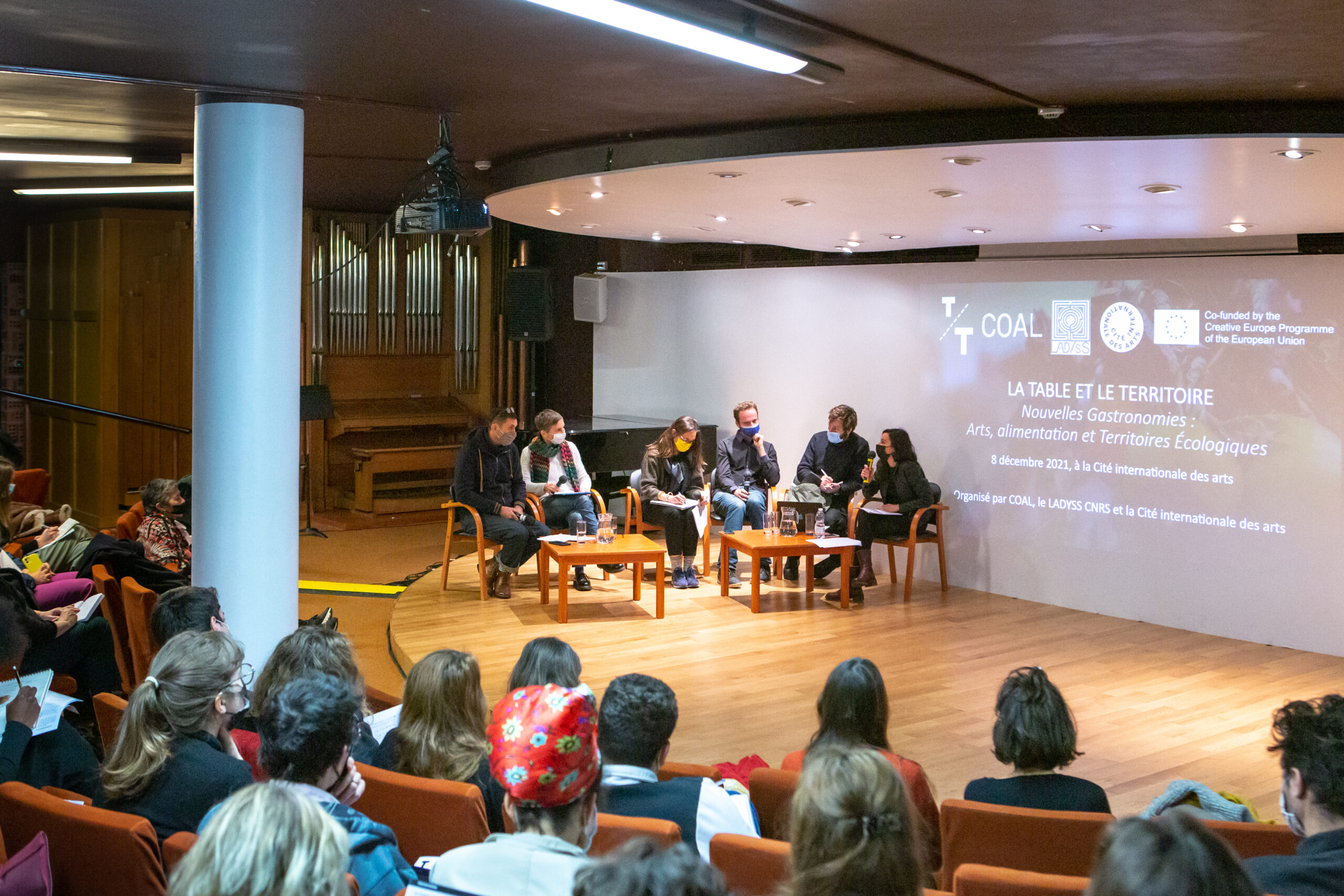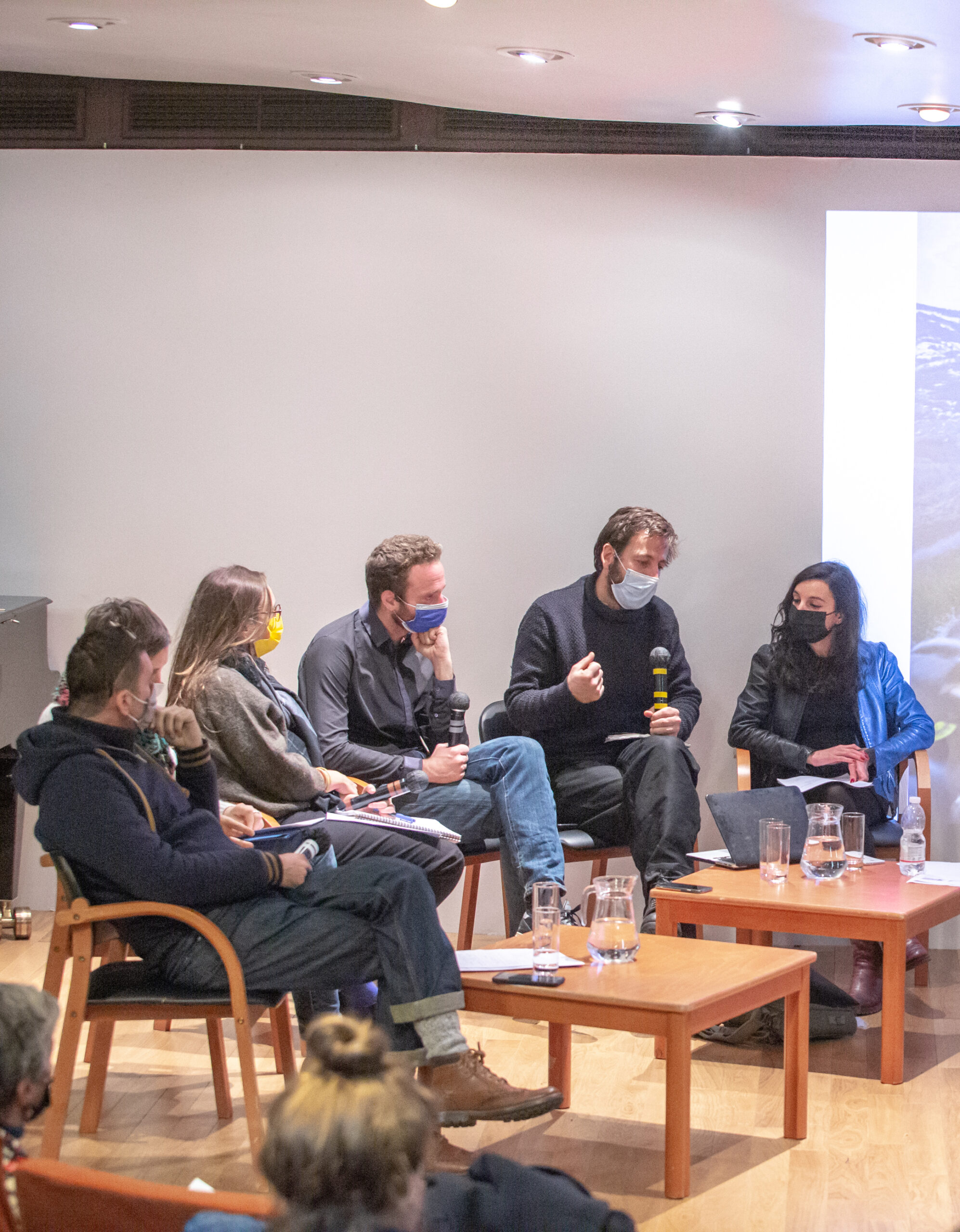 What culture-based solutions can artists provide today to transform food territories and imagine the sustainable food of tomorrow?
What culture-based solutions can artists provide today to transform food territories and imagine the sustainable food of tomorrow?
New Gastronomies: Arts, Food, and Ecological Territories is the result of a program that reports food today through the prism of art and ecology. This program was created during a dedicated day, on December 8, 2021, at the International City of Arts in Paris.
Through more than twenty workshops, culinary experiences, artistic performances, and films, round tables have been organized to deepen the reflection around this theme. These discussions brought together farmers, scientists, peasants, artists, and promoters of cultural projects from Europe and elsewhere. Through this multiplicity of perspectives and this cultural diversity, the guests were able to discuss practices and demonstrate the potential of solutions based on the culture in the transformation of food territories.
Moderated by Clara Breteau, this conference was an opportunity to connect different food actors around what is our relationship to our territories and places of life. Apart from the nourishing relationship of the land, it is also a question of the notion of territory which existentially nourishes us.
These artists or geographers have in common the idea of defending and taking care of a nourishing territory with the help of artistic practice around what makes food. In addition to developing their practices, this conference questions more broadly the relationship between food and culture: In what way the artistic practices of the speakers are they still art through the context of the territories, or in what these practices show us that the essential is perhaps elsewhere, perhaps in a more anthropological notion.
Marina Pirot: Artist-researcher committed to practices and gestural knowledge in landscapes, creates modules of perceptual experiences referring to somatic and choreographic techniques that are activated in selected fields of research, in collaboration with various partners. Curator of exhibitions and founder of artists’ residencies for a few years, she is currently conducting theoretical and practical research on aesthetic transition in the light of ecological changes. She practices and studies artistic devices involving inter-corporeality and somatic practices.
Dominique Leroy: Sound artist and designer of collaborative projects, Dominique Leroy lives in Nantes and works in the landscapes of various “sentinel territories” (Loire estuary, Alpine natural parks, Czech countryside, Californian permaculture centers…). In 2016, he co-founded (n) with Marina Pirot with whom he explores the vibratory qualities of landscapes through an approach that combines sound and somatic practices. He previously participated in numerous research residencies and exhibitions, contributed to numerous collective projects. CYCLO-FARM was initiated by Dominique Leroy and Marina Pirot within the Collective (n) in 2020. Both are today artists associated with the project and animate the creative process which involves many members, contributors, experts, and less experts, artists residents in Kerminy.
CYCLO-FARM implements landscape experiments and agricultural techniques based on collective work in a network and on multidisciplinary methods at the crossroads of agriculture, art, architecture, landscape, life, human and social sciences as well as engineering sciences.
Fernando Garcia Dory: He is an artist whose work engages specifically with the relationship between culture and nature, as manifested in multiple contexts, from landscape and the rural, to desires and expectations in relation to identity. Interested in the harmonic complexity of biological forms and processes, his work addresses connections and cooperation, from microorganisms to  social systems, and from traditional art languages drawing to collaborative agro-ecological projects and actions. He studied Fine Arts and Rural Sociology, and is now preparing his PhD on Agroecology.He has developed projects and shown his work at Tensta Konsthalle, Van Abbe Museum, Reina Sofia Museum, dOCUMENTA 12 and Biennales of Gwangju, Istanbul and Athens. He is the fondator of INLAND CAMPO ADENTR, a project that studies the role of territories, geopolitics, culture, and identity in the city-countryside relationship of Spain today. Its objective is to set up a cultural strategy over three years (2010-2013) to support the rural way of life through an international conference, artistic productions within the framework of a residency program, an exhibition, and a publication.
social systems, and from traditional art languages drawing to collaborative agro-ecological projects and actions. He studied Fine Arts and Rural Sociology, and is now preparing his PhD on Agroecology.He has developed projects and shown his work at Tensta Konsthalle, Van Abbe Museum, Reina Sofia Museum, dOCUMENTA 12 and Biennales of Gwangju, Istanbul and Athens. He is the fondator of INLAND CAMPO ADENTR, a project that studies the role of territories, geopolitics, culture, and identity in the city-countryside relationship of Spain today. Its objective is to set up a cultural strategy over three years (2010-2013) to support the rural way of life through an international conference, artistic productions within the framework of a residency program, an exhibition, and a publication.
Jean-Philip Lucas: He works on various cultural projects in the Paris region, in particular specializing in transitional urban planning and the development of cultural third places, with ANCOATS, a company of which he is a managing partner. Jean-Philip joined Olivier Darné at the Parti Poétique in December 2016 as development manager. He works in particular on fundraising, administrative monitoring and production monitoring as well as the coordination of Zone Sensible activities.
Ségolène Darly: Lecturer in Geography at the University of Paris VIII, Ségolène Darly specializes in urban agriculture, landscapes, and the representation of nature in the city. She works on the integration of agricultural spaces in urban planning and urban control for the relocation of agri-food systems as well as in conflicts of use and territorial constructions. Ségolène Darly is also a member of LADYSS, and is involved in the collective for the defense of nourishing lands of the ZAD in Saint-Denis.
Clara Breteau: She holds a doctorate in geography and cultural studies from the University of Leeds (UK). Winner of the AHRC Whiterose doctoral scholarship, her thesis, co-supervised by Nathalie Blanc, Nigel Saint and Claire Lozier, studies the poetic dimension of a set of autonomous ecological habitats. A graduate of the Universities of Cambridge (UK) and the Sorbonne, she currently teaches as a lecturer in art and ecology at the Biology of Aquatic Organisms and Ecosystems Laboratory.





